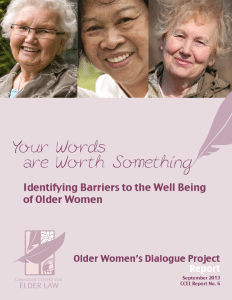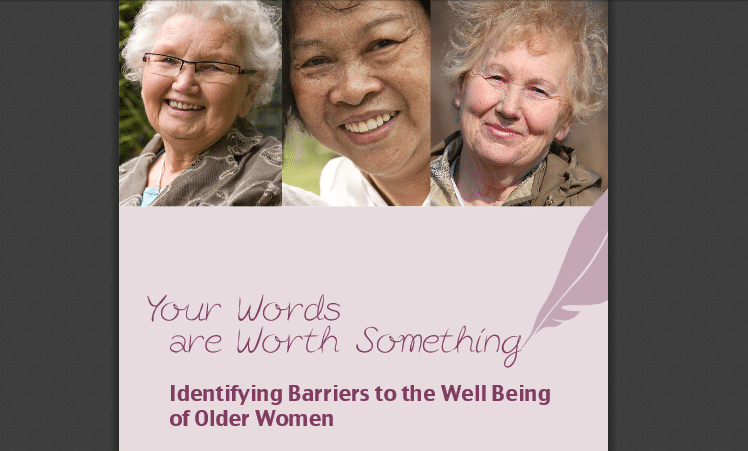Vancouver Sun columnist Daphne Bramhman wrote a thoughtful piece last week on the issue of seniors care. What follows is a copy of her column which was first published in the Vancouver Sun on October 9th.
++++
It is truly disturbing to think that we live in a society where elderly women are deemed invisible, disrespected and even abused by their children and grandchildren, rather than being respected, honoured and cherished.
But beyond the finding that physical, emotional and economic abuse is more common than anyone would like to believe, there is little surprising in the recently released report Your Words are Worth Something. 
That’s not to play down the tragedy and challenges faced by the more than 350 women who were interviewed for the report by the Canadian Centre for Elder Law and West Coast Women’s Legal Education and Action Fund.
For years, the data have shown women don’t fare as well economically as men as they grow older. Any pension income they have beyond Old Age Security and Canada Pension Plan isn’t likely as good because women still earn less than men. Besides, many spend considerable chunks of their earning years doing unpaid caregiving for children and elderly women live longer, which means they almost inevitably end up living alone, and the longer they live the more their fixed income erodes.
But the report cries out for context.
Things in Canada may not be perfect, but Canadian seniors are among the best taken care of in the world.
Canada is No. 5 in the first United Nations-sponsored ranking by Global AgeWatch, which was also only recently released.
Leading the list are Sweden, Norway, Germany and the Netherlands. But when it comes to health status alone, Canada is second behind Switzerland.
Here are some of the data that back up that ranking:
Canadian seniors’ health status is ranked as second in the world;
Only 4.4 per cent of Canadians 60 and older have an income less than the country’s median income (the point at which there are equal numbers of people above and below);
The average income/consumption of people 60-plus is 90.8 per cent of the average for the rest of the population; Seventy-eight per cent of Canadians get a pension;
As many people over 50 say their life has meaning as those aged 35 to 49, which is a generally accepted measure of well being;
When it comes to their place in society, the data for Canadian seniors indicate that 96 per cent have friends and family they can count on when in trouble and 93 per cent feel they are free to make their own choices.
Since we seem doomed to pay more attention to our southern neighbours than to the rest of the world – and especially given the current impasse over ObamaCare – it bears noting that Canadian seniors are healthier, with life expectancy averaging two years longer.
Where Canadians trail Americans is in old age pensions. The Canadian monthly payment of $547 US is far less than the Americans’ social security benefit of $674 US. One difference is that the U.S. benefit is only available to those who qualify, while the Canadian plan is universal, with benefits clawed back from high-income seniors.
It is concerning, however, that the Global AgeWatch data suggest that only 65 per cent of Canadians over 50 have access to public transportation. That echoes the Metro Vancouver survey finding that elderly women are isolated because they either can’t afford or don’t have access to transit.
Both reports highlight the need for a provincial, if not national, transit strategy backed by secure funding. [quote name=”Daphne Bramhman – Vancouver Sun Columnist” pull=”right”]Things in Canada may not be perfect, but Canadian seniors are among the best taken care of in the world. [/quote]
Still, right now Canadian seniors are among the best taken care of in the world. A 2009 report done for Finance Canada, for example, found that low-income Canadians generally earn at least as much in retirement as they did while they were working.
That’s all good news for the one in five Canadians who are now pensioners – albeit the Metro Vancouver report makes some valuable suggestions for tweaking that would address the specific needs of elderly women. But by 2050, one in three Canadians will be a pensioner.
Already, the federal government has announced that starting in 2023, the age limit for receiving Old Age Security will rise to 67 from 65.
Also being mooted is a substantial reduction in the income cut-off level for OAS eligibility, which would reduce the number of people getting the benefits but leave more money available for those who do. The government doesn’t claw back payments to seniors now until they earn nearly $71,000 a year. For couples, that means the threshold is close to $142,000.
So, the bigger and more important question is not how are seniors doing now, it’s how do we ensure that the next generation of pensioners will be OK without compromising the future of their grandchildren?




